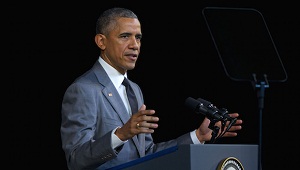 Some of the similarities reflect the speechwriter’s art. You’re visiting Havana, you invoke Jose Marti; visiting Moscow, it’s Tolstoy and Dostoevsky. Did Russian and American explorers cross paths in the Arctic? Yes, and Jackie Robinson played ball in Cuba. A U.S. president peddling the virtues of his political system always praises his hosts’ spiritual depth and resilience. (President Reagan’s phrase for this was “the true greatness of the heart and soul of your land.”) And he cannot fail to note how much those who left the old country have enriched life in the U.S. President Obama’s closing comments about how much Cuban-Americans have missed Cuba, and how much they want to work for its rebirth, were both moving and politically shrewd.
Some of the similarities reflect the speechwriter’s art. You’re visiting Havana, you invoke Jose Marti; visiting Moscow, it’s Tolstoy and Dostoevsky. Did Russian and American explorers cross paths in the Arctic? Yes, and Jackie Robinson played ball in Cuba. A U.S. president peddling the virtues of his political system always praises his hosts’ spiritual depth and resilience. (President Reagan’s phrase for this was “the true greatness of the heart and soul of your land.”) And he cannot fail to note how much those who left the old country have enriched life in the U.S. President Obama’s closing comments about how much Cuban-Americans have missed Cuba, and how much they want to work for its rebirth, were both moving and politically shrewd.
The core message of both speeches was, of course, the same: Trust the people, free their energy, and they will work wonders, not just economically but also politically and morally. Both presidents used their biographies to good effect—Mr. Reagan to plug worker rights (“I led my union out on strike, and I’m proud to say we won”), Mr. Obama to make some pointed suggestions about race relations in Cuba. Mr. Reagan used his description of worldwide progress to puncture the founding myths of Soviet communism. Why, I wondered, did Mr. Obama not use some version of this sentence from his predecessor’s speech: “In Latin America in the 1970s, only a third of the population lived under democratic government; today over 90% does.”
For all their similarities, the big difference between what Ronald Reagan said in Moscow and what Barack Obama said in Havana was how they said it. Mr. Reagan clearly thought he could use humor to make his case. What better way to take on the absurdities of the Soviet system than with a joke about bureaucrats sitting on their butts? The light-hearted approach did produce one of the speech’s wrong notes. (One wonders what the president could have been thinking when he summed up Mikhail Gorbachev’s perestroika with Butch Cassidy’s famous line about jumping over the waterfall: “You crazy fool, the fall will probably kill you.”) All the same, humor allowed Mr. Reagan to be scornful without being angry. Mr. Obama kept referring to “differences” with the Cuban leadership, as though there were two sides to the argument. Mr. Reagan—whether out of naivete or wisdom—assumed everyone listening knew that was a joke.
(By Stephen Sestanovich, from The Wall Street Journal)